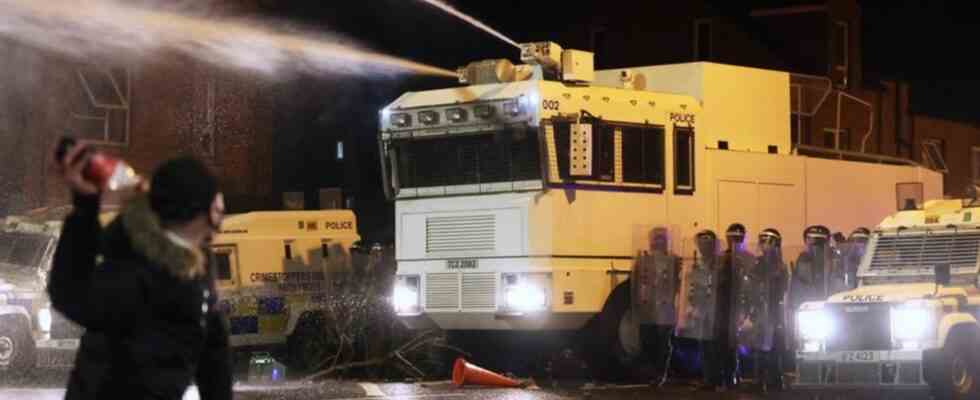Brexit
Expert: Northern Ireland standoff strengthens paramilitary groups
Police use a water cannon to crack down on violent protests in Belfast. photo
© Liam Mcburney/PA Wire/dpa
The unity government does not come about, London wants to hold new elections: The situation in Northern Ireland is volatile – that could benefit forces that had actually disappeared from the scene.
According to an expert, the ongoing political stalemate in Northern Ireland and the dispute over Brexit rules are strengthening the militant supporters of the union with Great Britain.
“New life has been breathed into the loyalist paramilitary groups,” Aaron Edwards, author of the book UVF: Behind The Mask, told the German Press Agency. There is a growing danger that terrorist groups such as the Ulster Volunteer Force (UVF), which are estimated to still have thousands of members, will end the ceasefire that was announced years ago.
“Shift away from protecting the peace process”
Once supporters of the peace deal in the former civil war region, they now see themselves as losers and their future within the UK in jeopardy, Edwards said. “Over the past 12, 18 months, we’ve seen a shift from protecting the peace process to undermining it.”
This does not mean that there will soon be attacks or that violence will flare up again. “But the mood has changed, and the UVF is slowly changing with it.” Most recently, the group announced that it would review the basis for the ceasefire.
Edwards said the militants were lumping all the problems together: years of public austerity, leaving the EU with the dispute over Brexit rules for Northern Ireland and the created customs border with the rest of the kingdom, and finally the prospect of the Catholic side for the first time regional head of government.
In Northern Ireland, Protestants who want to remain with Britain and Catholics who want reunification with the Republic of Ireland had been at odds for decades. More than 3,500 people died in the conflict. The UVF was one of the leading forces on the loyalist side. She laid down her arms in the mid-1990s.
The civil war ended in 1998 with the so-called Good Friday Agreement. It provides for the strongest parties from both camps to form a government together. However, all talks about it have failed. The British central government has now announced new elections.
“Could see an escalation to violence”
Edwards warned that an ongoing political vacuum or even elections would provide context for the groups. In addition, the previous UVF leadership, which had supported the peace process, had come under pressure. “If that leadership steps aside and more militant members take control, we could see an escalation to violence,” he said. Possible targets include representatives or institutions of the EU member state Ireland, which the loyalists have identified as primarily responsible for their concerns.
But it doesn’t have to come to that. “If all parties sit down again, the collective will of the people can withstand these people who want to drag Northern Ireland back into the dark ages.” On the Catholic-Republican side, paramilitary groups like the IRA terrorist organization once posed no threat to national security, Edwards said.

